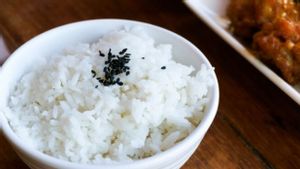JAKARTA - The Ministry of Industry (Kemenperin) continues to encourage digital transformation in the food and beverage industry (mamin) sector to spur productivity more efficiently and quality so as to increase industrial competitiveness.
"In terms of accelerating digital transformation, the Ministry of Industry (Kemenperin) provides facilities that include the implementation of self-assessment of INDI 4.0 Readiness Index (INDI 4.0) with a target of 800 companies in 2022 & 2023, and continued with technical guidance on industrial transformation 4.0 for managers and engineers, as well as the implementation of industry 4.0 in stages," said Director General of Agro Industry of the Ministry of Industry Putu Juli Ardika in Jakarta, quoted on Saturday, February 18.
Putu said that digital transformation in the food and beverage sector is important to encourage increased competitiveness and productivity so that they can compete at the global level by encouraging the application of industrial technology 4.0, both at the production, distribution, and development of industrial human resources (HR).
In an effort to continue to encourage the implementation of digital transformation, the Ministry of Industry has also appointed a lighthouse for the implementation of industry 4.0, technical guidance for industrial transformation 4.0 for 455 human resources in the food and beverage industry, and facilitated partnerships between 800 human resources for dairy cooperatives and the dairy processing industry.
Furthermore, implementing the commodity balance related to food and beverage through the National Neraca Commodity System (SNANK), piloting partnerships and digitization in the dairy processing industry, building an innovation center and developing industrial human resources 4.0, as well as providing incentives, such as super deduction tax for investments aimed at technological innovation, increasing research activities, and strengthening industrial human resource capacity.
Putu added that digital transformation in the food and beverage industry is expected to be able to support the sustainability of industry or sustainability and green industry, which is currently becoming a world trend.
These efforts are also to improve efficiency and effectiveness of sustainable resource use and are able to harmonize industrial development with the sustainability of environmental functions, and can provide benefits to the community.
"Industrial companies are aware of the importance of industry 4.0 and are starting to transform to be more efficient. Industry companies are also trying to make energy efficiency by updating technology that is more energy efficient, better energy management, and the use of renewable energy, such as solar panels and biomass for volatile fuels," explained Putu.
Currently, there are 10 food and beverage industry companies that have received green industry certification. The government continues to encourage the use of local resources as a clean energy source, such as the implementation of palm-based biodiesel and research & development for the use of biomass for sustainable energy.
On the other hand, the Ministry of Industry also continues to strengthen the ability of human resources in the food and beverage industry to deal with the era of digital transformation by encouraging training of digital transformation managers.
According to Putu, until now almost all of the food and beverage industries have carried out automation, especially in the production process so that industrial human resources need to continue to be improved so that they can develop following the demands of the times.
"We are targeting 1,200 people to be trained in the Training of Trainer (ToT) program and are expected to be managers of digital transformation. Furthermore, they will be able to guide the food and beverage industry in the ecosystem," added Putu.
Throughout 2020 to 2022, the food and beverage industry continued to grow positively. In 2022, the food and beverage industry grew 4.90 percent (yoy) and became the largest contributor to the GDP of the non-oil and gas processing industry in 2022, by 38.35 percent.
Exports of food and beverages including palm oil reached US$48.61 billion in January-December 2022. Meanwhile, imports amounted to US$16.52 billion in the same period.
"We are trying to be optimistic with the hope that the 2023 food and beverage industry can grow by around 6.25 percent," said Putu.
Meanwhile, General Chairperson of the Indonesian Food and Beverage Manufacturers Association (GAPMMI) Adhi S. Lukman said that food and beverage producers need technology that can integrate and provide comprehensive visibility of each supply chain system life cycle, ranging from supply of raw materials, production, packaging, distribution to consumers.
"This technology requires skilled experts in its operation, so that the development of human resources is the focus of GAPMMI in supporting our current members," he said.
The English, Chinese, Japanese, Arabic, and French versions are automatically generated by the AI. So there may still be inaccuracies in translating, please always see Indonesian as our main language. (system supported by DigitalSiber.id)








